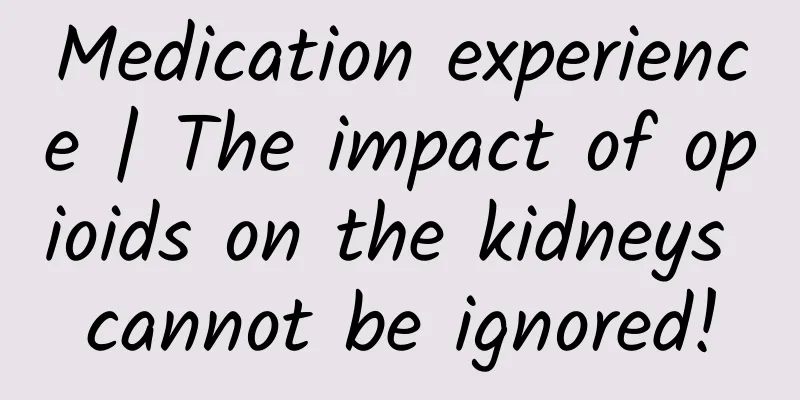Medication experience | The impact of opioids on the kidneys cannot be ignored!

|
Opioid receptors are widely present in the central and peripheral nervous systems, and when they are activated, further transmission of signals to higher pain centers is blocked. Opioid analgesics work by binding to these receptors, thereby reducing the perception of pain through the second messenger G protein pathway, thereby achieving an analgesic effect. Although opioid analgesics are widely used and have good analgesic effects, they can also cause many adverse reactions, such as increased excitability, systemic central nervous system depression, respiratory depression, organ damage, skin itching, constipation, urinary retention, etc. [1]. If the type and dosage are not appropriate, they can also cause kidney damage. When opioids are used for a long time, the distribution and accumulation of the drugs in various parts of the body will reach a stable state, and metabolites will also accumulate in various tissue spaces, which will cause kidney damage in the long run. Opioid overdose can also lead to dehydration, hypotension, rhabdomyolysis and urinary retention, leading to acute kidney injury (AKI). Studies have shown that long-term and repeated use of opioids is closely related to an increased prevalence of decreased renal function. In addition, compared with non-opioid users, users of prescription opioids have a higher incidence of proteinuria [2]. Glanzmann et al. conducted a retrospective case-control study showing that drugs are associated with acute renal insufficiency in children in pediatric intensive care units, among which the use of opioids is one of the high-risk factors for AKI [3]. The use of opioids can lead to reduced fluid intake, causing dehydration, which can lead to prerenal AKI, which is reversible. However, repeated dehydration and rehydration can lead to proximal tubular damage; dehydration through the aldose reductase pathway can lead to the production of fructose, causing oxidative damage to tubular cells. In addition, opioids can cause urinary retention by repeatedly interrupting the urination reflex, especially in elderly patients with prostatic hypertrophy. When opioids are used, urinary retention occurs due to the anticholinergic effect of opioids, thus causing AKI. Therefore, the use of opioids in clinical practice requires caution. When patients use the drug for the first time, if they already have kidney disease or high-risk factors for kidney damage (such as hypertension), they need to adjust the drug, dosage and course of treatment as appropriate to reduce the risk of kidney damage. Most opioids are excreted through the kidneys, such as tramadol, morphine, oxycodone, and hydromorphone. Patients who use them for a long time should have their kidney function checked regularly to detect abnormalities in time, especially special populations such as the elderly, newborns, and pregnant women. summary As the types of opioids increase and their clinical applications become more widespread, clinicians should increase their sensitivity to adverse drug reactions, be aware of the adverse reactions of opioids on the kidneys, and use opioids rationally to effectively relieve and treat pain while reducing the incidence of AKI and ensuring the safety of patient treatment. References: [1]Mallappallil M, Sabu J, Friedman EA, Salifu M. What Do We Know about Opioids and the Kidney? Int J Mol Sci. 2017 Jan 22;18(1):223. doi: 10.3390/ijms18010223. PMID: 28117754; PMCID: PMC5297852. [2]Novick T, Liu Y, Alvanzo A et al. Lifetime Cocaine and Opiate Use and Chronic Kidney Disease. Am J Nephrol. 2016;44(6):447-453. doi: 10.1159/000452348. Epub 2016 Oct 28. PMID: 27788520; PMCID: PMC5143165. [3]Glanzmann C, Frey B, Vonbach P, et al. Drugs as risk factors of acute kidney injury in critically ill children[J]. Pediatr Nephrol, 2016, 31(1): 145-151. |
<<: The Miracle Behind Sleep: What Does Your Body Do When You Fall Asleep?
Recommend
Are there any benefits for women to drink a cup of brown sugar water every day?
As we all know, brown sugar is very beneficial to...
Why do pregnant women always want to urinate?
It is very common for expectant mothers to always...
Five types of women should not eat watermelon
Watermelon is a fruit that can cool down and quen...
Seven reasons why you should not have a second child
With the introduction of the two-child policy, ma...
What are the best contraceptive methods for women?
In today's society, women's health has be...
What are the methods to unclog the fallopian tubes?
Many women and men have experienced infertility, ...
IDC: Philippine wearable market to grow 23.7% year-on-year in Q3 2022
According to the latest data from IDC, the Philip...
What should pregnant women pay attention to when they have chest pain?
Pregnancy is a special period and many people wil...
What are the dietary treatments for spleen deficiency in women?
As we all know, when the human body has endocrine...
Food therapy for menopause
Everyone may know the importance of menopause to ...
How many years does a woman usually reach menopause?
Women will have their periods since they enter pu...
After high-risk behavior, if the test result is negative, does it mean that there is no AIDS? The key to self-protection against AIDS is →
What exactly is AIDS? What is the HIV window peri...
Is it a problem for babies to suck their fingers? Don’t stop your baby from “tasting” the world with his mouth
People often say that "a child's hands a...
How long does a course of chemotherapy for breast cancer last?
Breast cancer patients need to pay attention to p...









